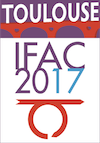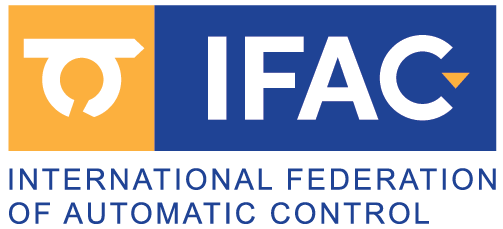Title: Intelligent Maintenance Systems
Track proposed by: Marco Macchi, Christos Emmanouilidis, Benoît Iung, Carlos Eduardo Pereira, Marcos de Sales Guerra Tsuzuki
Abstract: This session covers all theoretical and applications oriented aspects of reliability, maintainability, logistic support, PHM, diagnosis, prognostics, life cycle management and sustainability. The list of topics includes but is not limited to: Maintenance strategies, maintenance services, PHM, event detection, diagnosis, prognosis, decision support, dependability, asset and maintenance management, e-maintenance and emerging technologies, reliability and statistical approaches in maintenance, maintenance within production, condition monitoring and sensors and life cycle management and sustainability.
Code for submitting contributions: 1by6h
Full description: PDF
Title: Intelligent Systems supporting Supply Chains Decision Making
Track proposed by: Enzo Morosini Frazzon, Michael Freitag, Carlos Eduardo Pereira, Bernd Hellingrath, Shimon Y. Nof
Abstract: The integration of supply chains leads to increasing complexity, so that operational planning need to be supported by proper decision making models along with intelligent systems. Decision making models can apply optimization, simulation, or hybrid methods and approaches. At the same time, intelligent systems are composed by data acquisition, transformation, as well as communication systems embedded in technological devices. The proper exchange of data between the operational planning and intelligent systems allows for the emergence of adaptive, agile and resilient supply chains. The session will cover the technology-based integration of different supply chain tasks, such as: production planning and scheduling, transportation and logistics planning and scheduling, inventory planning, manufacturing systems as well as coupled services and technologies which can lead to improved supply chains. Track topics: The track chairs invite scientists, engineers and decision makers from government, industry and academia to contribute with theoretical and applied research papers. The aim of this session is to attract high-quality papers in areas including but not limited to the following topics: Inventory control, production planning and scheduling; Supply chains and networks; Simulation technologies inmanufacturing; Operations Research in manufacturing; Modeling, simulation, control and monitoring of manufacturing processes; Monitoring, diagnosis and maintenance of manufacturing systems; Smart manufacturing systems; Maintainability, reliability, safety and dependability of production systems. Special attention willbe directed towards practical relevance and approaches that can foster innovation in manufacturing supply chains.
Code for submitting contributions: 3rycn
Full description: PDF
Title: Marine and Maritime Robotics: Innovation and Challenges
Track proposed by: Enrica Zereik, Marco Bibuli, Antonio M. Pascoal, Pere Ridao, Nikola Miskovic
Abstract: Marine and maritime robotics are extremely actual and interesting research fields that pose formidable challenges both from a theoretical and practical standpoint. Many core problems in these areas are still open, and considerable research work is required to address and solve them. The complexity of the problems at hand requires a multifaceted approach to system analysis and design to exploit the use of methods and tools from dynamical systems theory, automatic control, networked systems, identification and estimation, computer vision, communications, sensing and measurements to yield practical systems capable of executing complex scientific and commercial missions at sea in an efficient and reliable manner. For these reasons, there is considerable interest in bringing together the marine robotics community and specialists on a number of complementary areas (includingautomatic control and related topics) to foster new synergies and promote joint research activities aimed at solving practical problems with far reaching implications on scientific, commercial, and societal marine-related issues. It is against this backdrop of ideas that we submit an invited open track proposal entitled Marine and Maritime Robotics: Innovation and Challenges, aimed atbringing attention to this exciting field of research and promoting the cross fertilization of ideas required to bring new theoretical and practical advances to bear on the development of innovative systems.
Code for submitting contributions: r5i7s
Full description: PDF
Title: Statistical detection/isolation of cyber-physical attacks on SCADA systems
Track proposed by: Igor V. Nikiforov, Michele Basseville
Abstract: Undoubtedly, the security of supervisory control and data acquisition (SCADA) systems against cyber (-physical) attacks is extremely important. Recent incidents with essential large-scale services like electric power grids, transportation systems, communication networks, oil and gas pipelines, water distribution systems show that the negative economic and humanitarian impact of such attacks can be considerable. Modern SCADA systems can be attacked externally and internally at different levels: communication network, supervisory control level, and also technical (physical) processes by using physical breach. The cyber-physical attacks, i.e. the simultaneous attacks on the cyber and technical facilities are considered as the most dangerous. This emerging area of research covers different methods of on-line (sequential) detection/isolation of cyber-physical attacks. The goal of the attack detection/isolation system is to detect as soon as possible such attacks in order toavoid grave consequences but also to satisfy a given level of false alarms. In the framework of this track, a special attention will be paid to statistical detection methods and machine learning methods for attack detection. The goal of this track is to bring together the theoreticians and practitioners of cyber-physical attack detection/isolation and the specialist in SCADA systems security in order to define the most useful models and scenarios of such attacks and the best methods for theirdetection/isolation.
Web site: none
Code for submitting contributions: 33ppy
Full description: PDF
Title: Operator data-driven framework towards estimation and control
Track proposed by: Mouhacine Benosman, Hassan mansour
Abstract: Recently, there has been considerable progress in data-driven methods for systems’ estimation and control. These efforts are motivated by the availability of vast data sets, emerging from large networks of sensors and data collection. In this special session, we focus on data-driven methods that exploit tools from automatic control and multivariate data modelling in order to discover systematic structures in the spatial domain, and temporal domain. The discovered structures are then used to estimate and control the system. More specifically we want to invite submissions which study operator data-driven framework for system’s modeling estimation, control, and their applications to real-world examples.
Web site: none
Code for submitting contributions: mm26s
Full description: PDF
Title: Open issues and Trends for Model Based Systems -and System of Systems- Engineering
Track proposed by: Eric Bonjour, Vincent Chapurlat, Carlo Leardi, Alfredo Garro, Frédérique Mayer, Jean-Claude Roussel
Abstract: Systems Engineering (SE) is an engineering discipline whose responsibility is creating and executing an interdisciplinary process to ensure that the customer and stakeholder's needs are satisfied in a high quality, trustworthy, cost efficient and schedule compliant manner throughout a system's entire life cycle (INCOSE 2015). Key characteristics of Systems Engineering processes are that they are collaborative, iterative, model-based. These processes may concern (or be adapted to) the design of systems with various levels of complexity including Systems of Systems (SoS). It is then called SoSE. SE and SoSE rocesses, methods and tools are either overlapped or interfaced with other domains such as project management or dependability. A current trend in SE is to develop Model-Based approaches representing and highlighting how requested stakeholders’ expectations and requested systems’ values are taken into consideration, by means of operational, functional, logical, physical… “views”. Model Based Systems Engineering (MBSE) enables designers to define and to manipulate various kinds of system models e.g. for analyzing system architecture or simulating the system behavior with interrelated models in order to verify that the requirements are met (INCOSE 2007). The aim of this open invited track is to gather international state-of-the-art research results and case studies, and to explore new Systems Engineering and System of Systems Engineering directions and emerging trends. We invite authors to submit high quality contributions describing significant, original, and unpublished results. The topics of interest include, but are not limited to:
- Model-Based Systems Engineering and System of Systems Engineering
- Requirements authoring and Verification
- Architecting Systems to Address Multiple Stakeholder Values Model-Based Safety Assessment for SE
- Non Functional properties in Architecting and Design processes: issues on native Resilient, Robust, Interoperable, Safe and Maintainable Systems
- Product lines engineering based on SE principles
- Early verification and validation considering value notion
- Effective Decision Making for SE
- Integration of human factors in SE...
Code for submitting contributions: g5b94
Full description: PDF






























